- 252
- 274SHARES
At the start of 2018, The New York Times continued funding its ad campaign seeking to convince readers the newspaper is a reliable arbiter of “truth.” A letter by the newspaper’s new publisher, Arthur Gregg Sulzberger, assured the public that “The Times will hold itself to the highest standards of independence, rigor and fairness.” This followed a 2016 letter by its previous publisher, Arthur Ochs Sulzberger, Jr, promising the same.
But the paper’s handling of the Arab-Israeli conflict has long been seen as slanted against Israel — obsessed with perceived flaws of the Jewish state and eager to downplay the Palestinian role in perpetuating the ongoing conflict. That view is corroborated by detailed analysis.
Will 2018 bring fulfillment of New York Times promises, or more of the same? CAMERA’s timeline keeps track of the newspaper’s stumbles in its coverage of the conflict this year.

Dec. 7, 2017
HIDDEN IN TRANSLATION
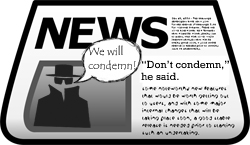
New York Times claims an Egyptian intelligence officer told media figures not to condemn American recognition of Jerusalem as Israel's capital. But audio of his phone calls makes clear the opposite is true. "Do you understand?" he told one media figure. "We will condemn without a doubt." (More…)
… also on Dec. 7
RAMALLAH REMODELED
The New York Times describes Ramallah as a "dreary" town, after an Egyptian intelligence official suggests it might work as a Palestinian capital.
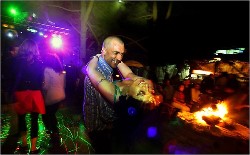
In previous New York Times reports, though, Ramallah was lauded as the "bustling," "sophisticated" "de facto capital" and "center of Palestinian government and cultural life," "home to music, dance and arts festivals," where "bars and café's are filled with laughter" — "a destination" for international tourists and Palestinians alike. (More…)
Dec. 13
IGNORING ANTI-SEMITISM
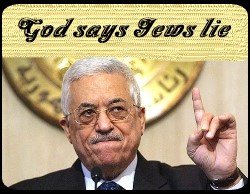
Palestinian president Mahmoud Abbas tells Muslim heads of state that Jews are expert at falsifying history and religion, and that God said as much in the Koran. The New York Times covers the speech — but ignores Abbas's anti-Semitism. (More…)
Jan. 9, 2018
EASY ON UNRWA

In an article promising to tell readers "What is Unrwa," The New York Times fails to note the controversies that plague the agency. (More…)
Jan. 14
SOFT-PEDALLING ABBAS (AGAIN)

After the Palestinian president rewrites Jewish history, for example by absurdly claiming Jews preferred slaughter in the Holocaust over life in Palestine, the New York Times ignores much of what prompted observers to call the televised speech "outrageous," "unhinged," and "shameful" — and even repeats some of Abbas's falsehoods without challenge. (More…)
Jan. 19
SIDING WITH THE JEWS?
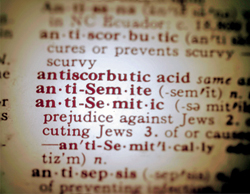
The newspaper claims Kenneth Marcus, nominated for a position at the U.S. Education Department, has sided with Jews against "students of color," citing his support for a definition of anti-Semitism said to be embraced by Jews and opposed by Palestinians.
Unmentioned is that the definition has been endorsed by the State Department, and that a virtually identical one is used by the European Union.
Jan. 29
A WIFE LOSES HER TEMPER

Although it ignored anti-Semitic language by the Palestinian prime minister a month earlier, the newspaper publishes a detailed piece about a nearly 10-year-old recording of the Israeli prime minister's wife losing her temper during a phone call.
Feb. 1
WATERED DOWN BDS EXTREMISM

The New York Times tells readers that BDS acts against Israel "primarily in protest against its settlement and security practices in the West Bank" — but leaders of the self-proclaimed boycott "movement" make clear their motivation is much broader, with a series of demands that amount to a call for the elimination of the Jewish state, and have even admitted they desire a country where Jews are, by definition, a minority.
(More…)
Feb. 8
"HARD-LINE" JEWS BACK JERUSALEM CAPITAL
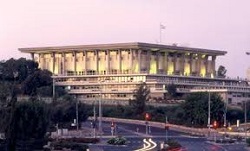
Days after downplaying the extremism of anti-Israel BDS activists, the New York Times associates support for the U.S. decision to recognize Israel's capital in Jerusalem with "hard-line" Jews. But mainstream Jewish organizations support the idea, as does President Obama's former ambassador to Israel and, in 1995 and 2017, overwhelming bipartisan majorities in Congress. (More…)
Feb. 16
WHERE DID ABBAS GO?
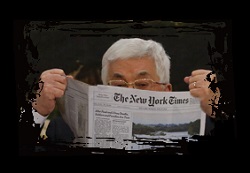
Less than a week after the New York Times reported about the Gaza Strip's struggles that "the heart of the crisis" and "its most immediate cause" is a infighting between the two largest Palestinian factions, Hamas and Mahmoud Abbas's Fatah party, the newspaper changes its tune, opting to hide Abbas's role in the territory's "unraveling."
(More…)
March 12
GAZA SUFFERING, REPRISE

Again, the New York Times avoids telling readers of Palestinian responsibility for suffering in the Gaza Strip, this time attributing a shortage of medicine and water to "a blockade by Israel and Egypt." In fact, the Palestinian Authority is primarily responsible for the scarcity in medicine, and overpumping has caused water shortages. (More…)
March 20
UNDIPLOMATIC IMMUNITY
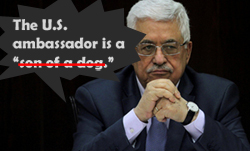
The New York Times is mum after the Palestinian president calls the American ambassador a "son of a dog." (More…)
March 20
"LAND DAY" AND "PALESTINIAN LAND"
A story errs twice on land-related issues. It describes Land Day as "the anniversary of some of the first collective protests against the Israeli occupation" — in fact, as prior Times stories have noted, it marks the 1976 requisition of Arab-owned land in Israel and Arab deaths during riots that followed.

The article also casts East Jerusalem and Area C of the West Bank as "Palestinian territories." They are not.
April 7
"PEACEFUL" MOLOTOV COCKTAILS AND STONES
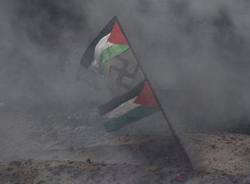
Despite the Hamas fighters who planted explosives, hurled Molotov cocktails, and attempted to breach the border, a "news analysis" piece refers to Hamas provocations as an "experiment with nonviolent protest." Why? Perhaps to help sell the reporter's claim that Israel uses "disproportionate force" — a partisan allegation that might be acceptable on the opinion pages, but not on the news pages. (More…)
April 13
A CORRECTION: MARCH IS FOR "RETURN"
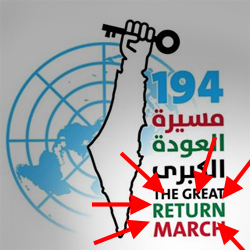
The New York Times mischaracterizes Palestinian demonstrations as merely a protest against the blockade on the Hamas-ruled Gaza Strip. Following CAMERA's intervention, the newspaper updates its language to acknowledge Palestinian demand for a so-called "right of return." (More…)
April 16
HAMAS IS NOT JOHN LENNON

A headline in the Times print edition, "Battle Weary, Hamas Gives Peaceful Protests a Chance," invokes John Lennon's famous anti-war lyrics. But Hamas, a terror group, also gives Molotov cocktails, attack tunnels, and talk of eviscerating Israelis a chance. (More…)
April 18
OP-ED ERRS ON ADMISSIONS COMMITTEE LAW

Israeli MK Ayman Odeh tells New York Times readers that an Israeli law allows small towns to racially discriminate against potential residents. The law actually says committees may not reject candidates "for reasons of race, religion, gender, nationality, disability, personal status, age, parenthood, sexual orientation, country of origin, political-party opinion or affiliation." (More…)
April 21
A CORRECTION: PENSION FOR MURDERERS "NOT A CONSPIRACY THEORY"
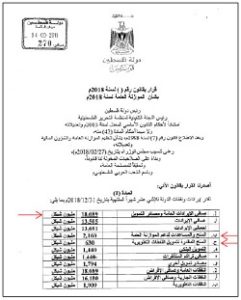
An article in the newspaper's Technology section says reports about Palestinian payments to the families of terrorists is a "far-right conspiracy." CAMERA's communication with editors leads to a correction. "That is not a conspiracy theory," the Times admits. (More…)
May 3
ABBAS ANTI-SEMITISM COVERED—EVENTUALLY
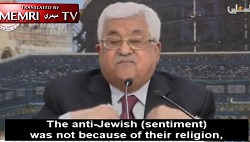
Two full days after the Palestinian president blamed the Holocaust on the Jews themselves, the New York Times comes around to publishing a news story on the speech, followed by an editorial slamming Abbas's "vile words." (More…)
May 15
HAMAS SHOOTERS DUBBED "PROTESTERS"

The newspaper repeatedly reports that "Israeli soldiers killed 60 protesters." In fact, at least 11 of the casualties were well-armed combatants. Eight were Hamas gunmen that opened fire on Israeli soldiers, and three were planting explosives along the border fence. The Times later insists it is accurate and appropriate to describe those opening fire on Israelis as mere "protesters." (More…)
May 21
JOURNALIST CRITICIZES JOURNALISTS FOR PUBLISHING CRITICISM OF JOURNALISTS

Declan Walsh, one of the New York Times reporters who counted Hamas shooters as "protesters," suggests Wall Street Journal editors should have suppressed an opinion piece that criticized both Hamas and journalists that had fallen for the group's propaganda. (More…)
June 14
GUNMEN ARE FORGOTTEN, AND ARSONISTS DUBBED "PROTESTERS"
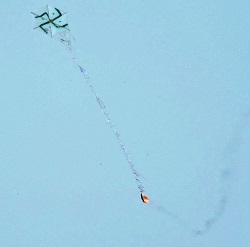
After referring to criticism of Israel's use of lethal force "against protesters," the newspaper asserts that "some protesters have attempted to breach the fence or have lobbed firebombs and sent flaming kites over the fence into Israel," casting Palestinian arsonists as protesters and ignoring Israel's descriptions of gunfire and I.E.D. attacks against its soldiers.
June 20
MANUFACTURED PARTISANSHIP ABOUT UN BIAS
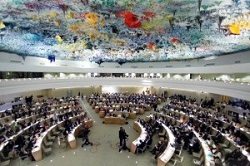
In an egregiously deceptive half truth, the New York Times insists it is "conservatives" who have taken issue with the United Nations Human Rights Council. In fact, criticism has consistently been leveled by liberals, senior Obama-administration officials, Secretaries-General of the U.N., and even the New York Times editorial board. (More…)
July 9
"INGENIOUS" ARSON ATTACKS
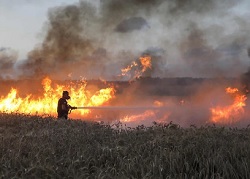
The New York Times describes Palestinian arson attacks that scorched thousands of acres of Israeli territory as "ingenious," continuing a pattern at the newspaper of using adjectives that tilt the news. (More…)
June 20
REWRITING HISTORY OF JEWISH STATE AND BEN-GURION

A Times reporter absurdly insists that until now, Israel had been envisioned as a state in which every national group exercises national self-determination, and misstates the views of Israeli founding father David Ben-Gurion. (More…)
Aug. 9
HAMAS FIRES ROCKETS, NYT DOWNPLAYS ESCALATION AND INTENT
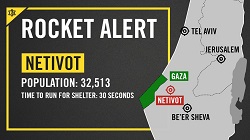
After a night of relentless Palestinian rocket attacks and subsequent Israeli airstrikes, the Times, unlike other news organizations, conceals cause and effect by obscuring the chronology of attack and counter-attack, and falsely claims Palestinian rockets weren't fired at population centers. (More…)
Aug. 15
FEELING THE LOVE, READING THE MIND

A purportedly objective news story insists Peter Beinart, a divisive and persistent critic of the Jewish state, is "known for his love of Israel." (More on the newspaper's use of labels…)
Sept. 12
ATTACKING OPPONENTS OF ANTI-SEMITISM
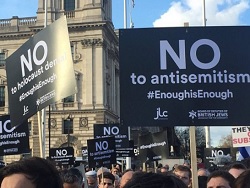
The newspaper continues its streak of editorializing on the news pages, this time to slur a U.S. official after he adopted a widely used definition of anti-Semitism and opened an investigation into anti-Jewish discrimination. It response, a journalist called him an "opponent of Palestinian rights" and someone who works to "squelch" free speech. (More…)
Sept. 13
OSLO ACCORDS (AS ONE SIDE SEES THEM)
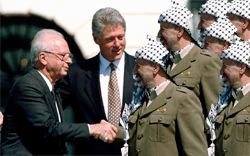
Evenhanded? The newspaper quotes 11 Palestinians but only 2 Israelis in its 25th-anniversary retrospective of the Oslo Accords—and the reporters' own language make the imbalance even worse. (More…)
Sept. 18
PALESTINIAN ATTACKS LABELED "RESPONSE"

A caption taken straight from Turkey's state-run media agency and propaganda arm insists at a Gaza riot "Palestinians threw stones in response to Israeli forces' intervention during an anti-occupation rally." Turkey, and by extension the New York Times, was wrong. (More…)
Oct. 9
ANTI-ISRAEL ACTIVIST ISN'T ANTI-ISRAEL?
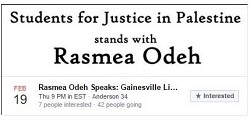
In a piece about Lara Alqasem, a former chapter president of the virulently anti-Israel campus group Students for Justice in Palestine, the Times insists that the anti-Israel activist's credentials as an anti-Israel activist are "far from clear-cut." It is a striking contrast with the newspaper's allegation that Kenneth Marcus, an critic of anti-Semitism, is supposedly "a longtime opponent of Palestinian rights causes." (More…)
Oct. 18
DESTROYING ISRAEL IS A "PALESTINIAN RIGHT"
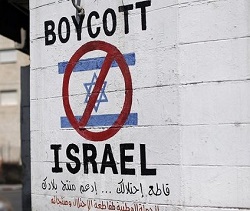
After an Israeli court allows Lara Alqasem to remain in the country, the Times claims she had initially been barred because she defended "Palestinian rights." In fact, she was barred because, as the head of a virulently anti-Israel organization, she endorsed BDS, a movement that seeks to eliminate Israel by making Jews a minority in the country. (More…)
Oct. 22
CONCEALING A STABBING
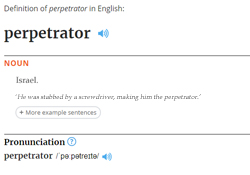
The Times suggests an Israel aggressor killed two Jordanians after a "confrontation." It doesn't tell readers the confrontation began when the Israeli was stabbed. (More…)
Oct. 29
AFTER PITTSBURGH, SOWING DIVISIONS
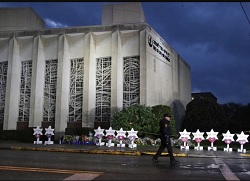
After a deadly attack at a Pittsburgh synagogue attack, the newspaper insists Israel's chief rabbi refused to use the word "synagogue" when describing the site of the massacre. That isn't true. (More…)
Nov. 13
KEEPING HAMAS WAR CRIMES UNDER WRAPS

An article draws a false equivalence between indiscriminate Hamas rockets and Israel's targeted response, including by claiming Israeli civilians were "caught up" in the fighting. They were targeted in the fighting. (More…)
Nov. 14
IT'S ALL ISRAEL'S FAULT

The newspaper's historical explanation of how Gaza arrived at its dire situation says nothing about Hamas decisions or actions. Only Israel is said to be responsible for the consequences of Hamas rule over the territory. (More…)
Dec. 13
A PALESTINIAN TERROR ATTACK IS "BOLD"

A reporter looks for the right adjective to characterize a deadly Palestinian attack on Israelis waiting at a bus stop, and settles on the word "bold." (The word was removed in a subsequent version of the story.) (More…)
Nov. 14
AN "INSANELY" ANTI-SEMITIC BOOK RECOMMENDED

In treating anti-Semite Alice Walker as if she's still nothing more than the author of The Color Purple, the Times plugs without qualification a virulently anti-Semitic book by one of Walker-the-anti-Semite's favorite authors, conspiracy theorist Icke. (Read more at Tablet…)
Dec. 19
AN EDITORIAL, TOO, DOWNPLAYS BDS
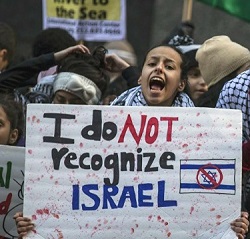
Misrepresenting BDS as a means of “supporting Palestinian rights” rather than a movement dedicated to Israel's destruction, an editorial decries proposed legislation against compliance with foreign-organized anti-Israel boycotts and laments that such legislation would “cripple” the BDS campaign and “deprive” the Palestinians of a vehicle to attack Israel. (More…)
Dec. 25
IRAN AND HEZBOLLAH'S CHRISTMAS PROPAGANDA
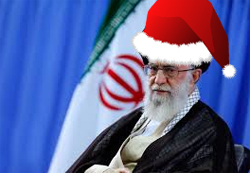
The Times fails to treat with due skepticism Iran and Hezbollah's propaganda about "inclusivity," plurality, and the Christmas spirit. (More…)
Dec. 30
ZOOMING IN ON A BULLET AND GLOSSING OVER ROCKETS
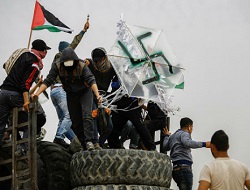
In the New York Times, an Israeli bullet that ricocheted off the ground then hit a Palestinian is cast as a war crime, but Palestinian rockets aimed at Jewish civilians are not described as crimes, as targeting civilians, or even as coming from Palestinians.(More…)
